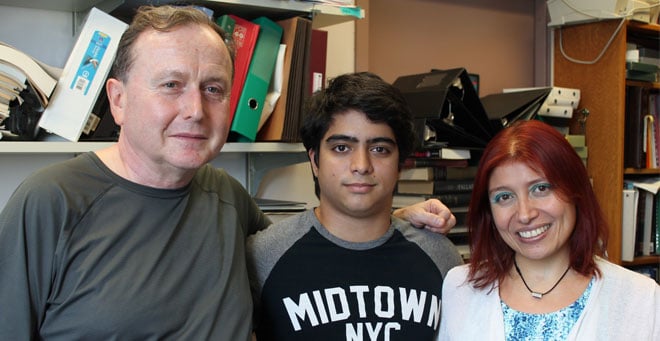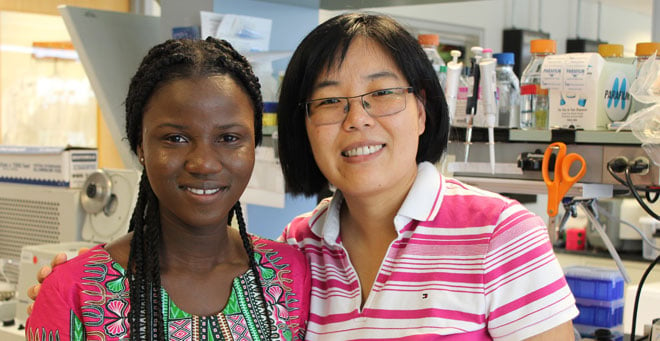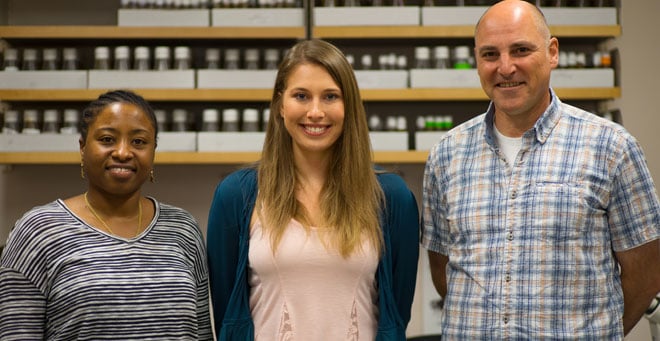 |
|
|
Sergio Nunez Baez (center) is pictured with principal investigator Jeffrey Nickerson, PhD, and Teresita Padilla-Benavides, PhD. |
|
 |
|
|
Solange Fine Amedetowou (left), with Aroian lab faculty member Yan Hu, PhD. |
|
 |
|
|
Andreas Bergmann, PhD (right) hosted college student Heather Nelson (center) in his lab under the supervision of postdoctoral associate Alicia Shields, PhD (left). |
The 25 college students in the Summer Undergraduate Research Program have spent the past 10 weeks conducting sophisticated research with distinguished principal investigators at UMass Medical School. Whether planning to become physicians, biomedical scientists or something not yet undecided, their immersive and challenging hands-on experiences will help shape their upcoming career decisions.
“If you had given me the option to create my perfect summer experience, it wouldn’t have been as great as this!” said Sergio Nunez Baez, a rising senior at the University of Puerto Rico who has been working in the lab of Jeffrey Nickerson, PhD, professor of cell & developmental biology, and plans to go to medical school after graduation. “There are not many role models for scientists in Puerto Rico, so my time here has completely solidified my belief that I can succeed as a neurosurgeon and scientist.”
The summer program is designed to diversify the pool of biomedical researchers by providing structured, hands-on laboratory research experiences to undergraduate students, especially those from backgrounds under-represented in the field, or who are economically or educationally disadvantaged. Funding is provided by either the National Institutes of Health or the UMMS Office of Research.
Nunez Baez has learned that he can function as part of a scientific team; mastered sophisticated three-dimensional microscopy skills; and tested a new experimental approach to understanding mRNA export from a cell’s nucleus to cytoplasm, a process that is regulated by an important signal transduction pathway in cancer.
“It’s hard to know what science is until you actually do it,” said Dr. Nickerson. He said he had a summer job in a biochemistry lab as an undergrad majoring in psychology and it was a life-changing experience. He went on to earn his doctorate in that same lab.
“We pick the best and the brightest students and bring them here in order to recruit them into research,” he said.
Solange Fine Amedetowou, also planning to head to medical school when she graduates from the State University of New York at Potsdam, was challenged to advance the knowledge of parasitic intestinal worms in the laboratory of Raffi Van Aroian, PhD, professor of molecular medicine. Working closely with Yan Hu, PhD, research assistant professor of molecular medicine, in Dr. Aroian’s lab, Amedetowou especially appreciated the program’s intensity and structure.
“Dr. Aroian likes to challenge students with independent projects,” said Dr. Hu. “Our focus is on what they learn, not necessarily what they do.”
“I was uncomfortable the first three weeks,” Amedetowou admitted, “but now I’m more confident and mature. I learned research requires a lot of patience, and that you have to sit back and think about how what you’ve learned contributes to the next step.”
Minnesotan Heather Nelson, who changed majors and is extending her undergraduate studies at Winona State University in order to incorporate scientific research with teaching, has made inroads in understanding a genetic pathway in fruit flies that could be a target for therapy to suppress abnormal cell growth like that which occurs in human cancers. She has been mentored by Andreas Bergmann, PhD, professor of molecular, cell & cancer biology, and postdoctoral associate Alicia Shields, PhD. “I came to science late and needed an experience like this one,” said Nelson, who plans to take a year to conduct further research before continuing to graduate school. “I have been happy to see outstanding collaboration in the lab, and have loved interacting with the scientists.”
Nunez Baez, Amedetowou, Nelson and classmates were selected from more than 1,800 applicants from colleges and universities throughout the continental United States, Alaska, Hawaii, Guam, Puerto Rico and the U.S. Virgin Islands.
“What this amazing group of young people has accomplished in 10 short weeks is guaranteed to impress,” said Deborah Harmon Hines, PhD, professor of cell & developmental biology, vice provost for school services and principal investigator for the Summer Undergraduate Research Program.
On Thursday, Aug. 4 the undergraduate researchers showcased the fruits of their labors with posters presentations in the old medical school lobby. The program closes on Friday, Aug. 5, with an awards ceremony and keynote speech from UMMS physician-scientist John Sullivan, MD, professor of pediatrics and molecular medicine.
Dr. Sullivan led the UMMS team that helped discover the drug nevirapine, which is widely used today to prevent mother-to-infant transmission of HIV at birth. A pioneering HIV researcher, he is an exemplary role model for today’s college students who will become tomorrow’s biomedical researchers.
Related stories on UMassMedNow:
Undergrads gain research credentials at UMMS summer program
Viewing living cells in three dimensions
UMMS sequences hookworm genome; may lead to new treatments for tropical disease